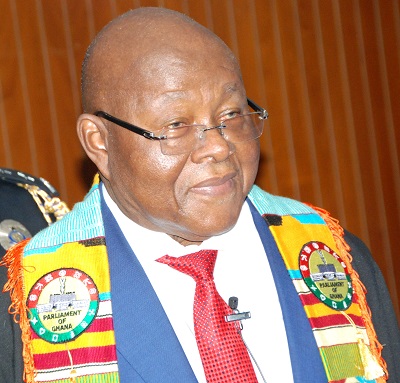
The Speaker of Parliament, Professor Aaron Mike Oquaye, has advocated the need for a new world order of cooperation and economic partnership for global development.
This new order, Professor Oquaye said, must encompass laws which promote global justice and equality and impact positively on poverty, misery and disease.
Other areas which must be looked at included promoting equality and due consideration to all among the comity of nations and laws which promote balanced enablement for the upliftment of all nations, he said.
“In short, treaties of economic justice which re-align the global economy, its management and ensuring equitable development [must change].
“Once this economic liberation is delivered, women empowerment, health, education, poverty, misery, disease and the attainment of the Sustainable Development Goals will follow automatically,” he said.
Professor Oquaye made this call when he addressed the 25th conference of Speakers and Presiding Officers of the Commonwealth in Ottawa, Canada, on Wednesday. The conference is themed, “Parliamentarians as effective legislators and constituency representatives: Evolving support required”.
Speaker Oquaye said the current world economic order where developing nations produce raw materials and the developed nations produce and export finished products to Africa was a continuation of the “colonial order of unblessed memory.”
“Ghana and Cote D’Ivoire for example, produce 60 per cent of the world’s cocoa but receive less than 10 per cent of the end product of global income. By the existing world Trade Organisation (WTO) framework, the Free Movement of Goods globally leads to the dumping unto African markets, cheap products of all kinds.
“The results are that infant industries are adversely affected. Notably, industrialisation was not achieved in any nation without Protectionist Measures to protect local infant industries.
“Our fruits, for example, need to be applied to processing into juices and vegetables into pastes, so as to avoid the glut in peak seasons and import in lean seasons. Before local industry can compete, it must be protected from cheap brands dumped from a number of nations.
“Hence, there is a dilemma here. Our produce can only be translated into finished products if we can avoid competition by a new global economic paradigm,” he told the conference.
He recalled how “Ghana sometime ago was compelled by protestation from the USA when it attempted to protect the production of chicken in Ghana through special tariffs. Steps must be taken globally to liberate us from this dilemma.”
To cure this dilemma, Professor Oquaye told his colleagues that the government of Ghana had initiated the One District One factory policy and One Village One Dam policy to guarantee all-year-farming to produce for the local manufacturing market.
Speaker Oquaye bemoaned the low levels of royalties on oil, which he estimated to be about five per cent, paid by explorers to African nations.
BY JULIUS YAO PETETSI



